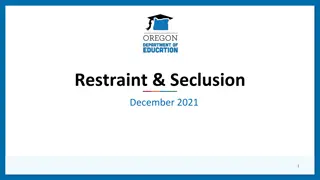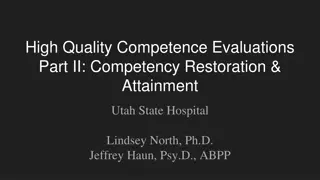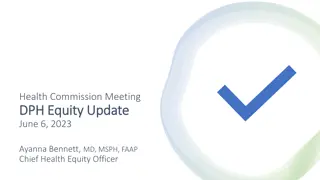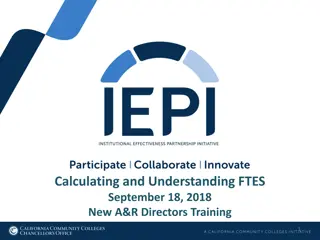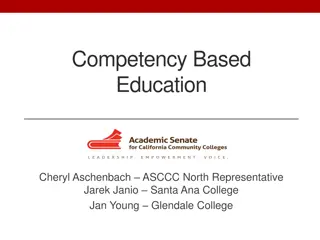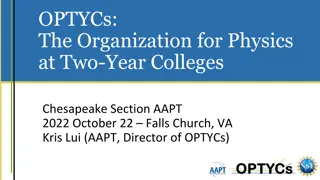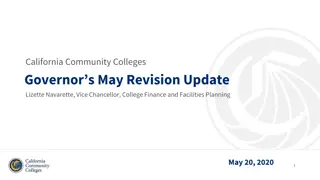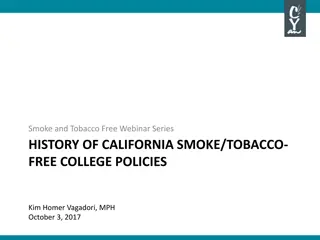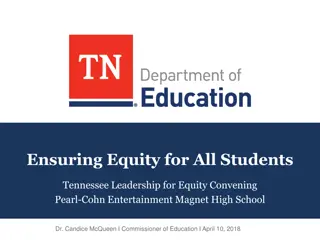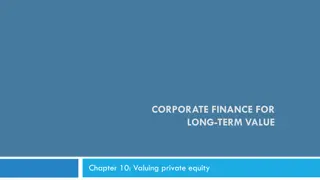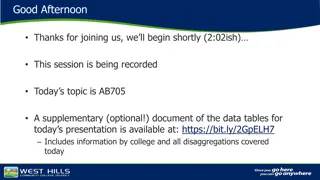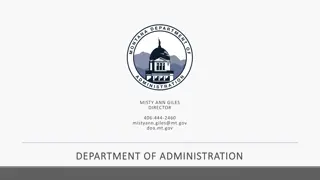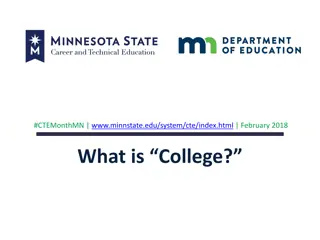Equity Framework for Competency-Based Education in California Community Colleges
This material discusses an Equity Framework for Competency-Based Education (CBE) in California Community Colleges. It highlights the strengths and challenges of the education system, focusing on student demographics, completion rates, and the importance of addressing equity gaps. The presentation also emphasizes the need to re-engage adult learners in the post-Covid era.
- Equity
- Competency-based education
- California Community Colleges
- Student demographics
- Completion rates
Download Presentation

Please find below an Image/Link to download the presentation.
The content on the website is provided AS IS for your information and personal use only. It may not be sold, licensed, or shared on other websites without obtaining consent from the author. Download presentation by click this link. If you encounter any issues during the download, it is possible that the publisher has removed the file from their server.
E N D
Presentation Transcript
An Equity Framework for Competency Based Education (CBE)
Randy Beach, ASCCC Curriculum Committee, Southwestern College (facilitator) Amparo Diaz, Success Center for California Community Colleges Chant e Guiney, CCCCO Specialist - Educational Services and Support Nadia Leal-Carrillo, Success Center for California Community Colleges Aisha Lowe, CCCCO Vice Chancellor- Educational Services & Support Today s Presenters 2021 ASCCC Curriculum Institute 2
An Equity Framework for Competency Based Education (CBE) The Why 2021 ASCCC Curriculum Institute 3
Strengths Unique Size and Scope Largest system of higher education in the U.S., serving 2.2 million students in 73 districts and 116 colleges Accessible Education Higher percentage of young people (18 24) attending college than other states (43% to 48%) Reflective of the State s diversity Serving students from varying ethnicities, ages, and levels of educational attainment Source: California Community College Vision for Success 2021 ASCCC Curriculum Institute 4
Challenges Time to Degree Students who complete an AA degree on average take 5.2 years (median time is 3.8 years) and often accumulate excess units along the way Completion Achievement Gaps Persist across the CCCs and regions of the state are not served equitably Only 48% of students who enter a CCC leave with a degree, certificate, or transfer after six years Source: California Community College Vision for Success 2021 ASCCC Curriculum Institute 5
Our Students RACE AND ETHNICITY AGE American Indian/Alaskan Native 0.3% African-American 5.6% 50 + 8% Asian 11.3% White 23.5% 19 or Less 31% FINANCIAL AID Filipino 2.8% 25 - 49 33% 2,291,918 Pacific Islander 0.4% 962,152 42% 20 to 24 28% 522,058 23% 119,896 5% Hispanic 46.3% Total Population System Fee Waivers Federal Aid Cal Grants Source: California Community College MIS Datamart 2021 ASCCC Curriculum Institute 6
Pre-Covid: Adult Learners Source: Back to College: Part One: California s Imperative to Re-Engage Adults by California Competes (Oct 2018) 2021 ASCCC Curriculum Institute 7
COVID 19 Impact on Students COVID-19 has changed my plans for college financially and emotionally. I am currently debating whether I should drop my Fall Semester classes because I need to find a full- time job to help my family. It s made it increasingly difficult to take on the full schedule of online classes topped with work from home and childcare from home all at the same time. My stress is through the roof. Source: California Student Aid Commission,California College Students Experiences during the Global Pandemic (June 2021) https://www.csac.ca.gov/sites/main/files/file- attachments/fall_2020_covid19_student_survey_results_presentation.pdf?1623427361 2021 ASCCC Curriculum Institute 8
Opportunities Provide high-Quality Pathways We need to be adaptive to meet the needs of learners while providing high-quality programs by trusted institutions Re-engage adult learners CBE is a great way to re- engage adult learners who need greater autonomy and flexibility Reimagine Student Support Services Under CBE student support services are more accessible to students Be adaptive to societal shifts CBE can flex with changing technologies, employer demands, and unexpected societal shifts Meet the goals outlined in the Vision for Success CBE for-credit opportunities will enhance student outcomes and will help us meet our goals Increase educational attainment in CA Career preparation is essential to the future of our state and our system 2021 ASCCC Curriculum Institute 9
Locally CBE is a tool for campus-wide transformation Faculty Role, Load and Contracts Student Support Services District/College Policies Dismantling silos to provide a tailored student experience leading to clearly defined competencies students can leverage in industry. Student Centered Directed Variably Paced Self DA CBE Outcomes Focused Institutional Data & Research Financial Aid SIS & LMS 2021 ASCCC Curriculum Institute 10
An Equity Framework for Competency Based Education (CBE) The What 2021 ASCCC Curriculum Institute 11
Title 5 CBE Definition Direct assessment competency-based education is an intentional outcomes-based equity-minded approach to earning a college degree with the expectations of learning held constant, but time is variable through a flexible, self-paced, high-touch and innovative learning practice. The goal of competency-based education is to empower students in their learning journey by providing a personalized, flexible, adaptive, and culturally responsive curriculum with which students can engage; it allows students to demonstrate mastery of learning and the achievement of competencies at their own pace aided by customized instructional and student service support. 2021 ASCCC Curriculum Institute 12
CBE Focuses on Mastery of Competencies Credit Hour Model Competency Based Education moves beyond seat-time focusing on mastery of competencies, through learning activities and experiences that align with clearly defined programmatic outcomes. based on seat time originally designed to determine faculty pensions and not as a measure of learning. Credit Hour is current basis for awarding financial aid, faculty workload & degree completion. Hours will vary, but the learning is fixed. Often fully online modules. Cracking the Credit Hour by Amy Laitinen Flexible academic calendar term options. 2021 ASCCC Curriculum Institute 13
Competency-based education is and is not. CBE is Time is variable with program offered in a flexible, self-paced approach CBE is not Learner works at course-set pace with pre- determined schedule of assignments, activities, etc. with true beginning and end dates Learning is fixed requiring demonstration of mastery of each competency Learning varies with passing course grade (i.e., A, B, C, D) Determined by rigorous summative authentic assessment focused on meeting core outcomes and competencies Student learning supported by faculty and staff throughout learning journey Completion of program is based on mastery of intentionally designed scaffold of all competencies Student evaluation varies based on accumulation of activities, exams, projects, discussion, attendance, etc. Independent study (i.e., students learn on their own and then take final exam) Achievement of credential is based on passing grades and credit-hours (i.e., 60 credit hours=AA/AS) 2021 ASCCC Curriculum Institute 14
Course/Credit-Based vs. Direct Assessment Course/Credit-Based CBE Yes Traditional academic terms are followed Yes, but bound within the term Students can accelerate through summative assessment Competency-based mastery Tied to courses Direct Assessment CBE No Credit-hour equivalences are established Yes, within and across the program Students can proceed at their own pace toward mastery Competency-based mastery Tied to the program Is the traditional academic term followed? Do students have autonomy over their progress? How is learning evaluated? Is transfer credit or CPL allowed? Yes No Yes Is an ACCJC substantive change approval required? No U.S. Secretary of Ed approval of 1st program also required 2021 ASCCC Curriculum Institute 15
Student Experience Freedom and flexibility Personalization Program is designed to minimize challenges Affordability Quality instructors and program Support from faculty and staff Trusted local institution Content applicable to current work 2021 ASCCC Curriculum Institute 16
An Equity Framework for Competency Based Education (CBE) The How 2021 ASCCC Curriculum Institute 17
Roadmap to Success 2021 ASCCC Curriculum Institute 18
Roadmap for Success Partner with Curriculum Committee (5C) Establish CBE Learning Collaborative Support System- Wide Implementation Draft Title 5 Regulation 2021 ASCCC Curriculum Institute 19
CCCCO Efforts to Date Jan 2020 Presentation to Board of Governors Jan 2020 June 2020 Partnered with 5C to Establish Title 5 Regulations Sept 2020 Presented Regulation at Sept BOG meeting (1st Reading) Nov 2020 Regulations approved by the BOG Dec 2020 Collaborative Applications made available Mar 2020 Applications Due June 2020 Launched the Direct Assessment CBE Collaborative 2021 ASCCC Curriculum Institute 20
Regulatory Framework The implementation of a CBE program will include related professional development. Regulations are needed to enable colleges to maximize state and federal funding for CBE programs. The student learning journey, with emphasis on equity, is the focus of the design and elements of the program. Focus on direct assessment competency-based education as a starting point. Program and module quality standards align with those of degree programs and degree-applicable credit courses. The regulations will reside under the Alternative Instructional Methodologies in Subchapter 3 of Title 5 Division 6 Chapter 6. Chancellor s Office approval will be required before a college can offer a CBE program for apportionment purposes. CBE programs will have a separate program approval process; modules are to be adopted as part of a program. In providing students with the flexibility to learn at their own pace, grading and transcripts systems will align with a national model. Regulations will allow for greater flexibility and will clearly differentiate between direct assessment CBE and other programs. 2021 ASCCC Curriculum Institute 21
Title 5 Regulations Policy Areas Program Standards: Focus on eliminating opportunity gaps Student support services Program Design: Modality Program Selection Flexibility Faculty Roles: Program design Unbundled roles Teaching and mentorship Credit Hour Equivalency: Level of learning Educational activities Assessments Alignment to existing credit courses Repetition and Withdrawal: No failing grades Redirect to credit programs Academic Grading: Focus on mastery Non-punitive 2021 ASCCC Curriculum Institute 22
An Equity Framework for Competency Based Education (CBE) The Collaborative 2021 ASCCC Curriculum Institute 23
The Pilot A collaborative of campuses implementing direct assessment CBE programs Close coordination with the CCCCO Seed money to launch programs Program development support Research implementation process and program outcomes Recommendations for improvement Inform broader system implementation 2021 ASCCC Curriculum Institute 24
Pilot Colleges Bakersfield Coastline East LA Madera Merced Mt. San Antonio Shasta Southwestern 2021 ASCCC Curriculum Institute 25
CBE Program Plans Programs Identified Business Administration (2) Early Childhood Education/Child Development (2) Kinesiology & Wellness (1) Technology & Logistics (1) Programs Being Considered Automotive Tech Communications Culinary Arts Cyber Forensics Elementary Teacher Education Environmentally Hazardous Materials Technology Geospatial Technology Health Information Technology Heavy Equipment Landscape Nursery Tech Sign Language 2021 ASCCC Curriculum Institute 26
Target Population of Students Recent High School Grads First Displaced Workers Parents Generation Incarcerated & Formerly Incarcerated Working Adults Military & Veterans 2021 ASCCC Curriculum Institute 27
Collaborative Timeline M1 M2 M3 M4 M5 M6 Establish Local Infrastructure Regional Accreditation & Approval Build Operational Model CCCCO Approval Select the Program Design the Program July 2021 - December 2021 July 2021 - December 2021 December 2021 - August 2022 September 2022 - December 2023 September 2022 - August 2023 September 2023 - November 2023 M7 M8 Action Research & Scalability Launch the Program Spring 2024 July 2025 - Ongoing 2021 ASCCC Curriculum Institute 28
Overview of Resources & Supports College Program Development Group Resources & Support Artifacts Research to Inform the Process Collaborative Syllabus Peer Learning Sessions Developmental Evaluation Individualized Support Vision Resource Center Coaching Ongoing Feedback 2021 ASCCC Curriculum Institute 29
Next Steps Stay up-to-date on the Collaborative by joining the CBE Vision Resource Center Community Identify the willing : faculty and others with an interest or experience with CBE Begin discussions with your Academic Senate or Curriculum Committee; Expand conversations to include admin and operations Establish a workgroup to investigate how CBE might benefit students Begin collecting LMI data for interested programs to identify CBE opportunities; this includes gauging student need and interest and consulting with community/four-year partners and advisory groups( for CE programs) 2021 ASCCC Curriculum Institute 30
Q&A info@asccc.org 2021 ASCCC Curriculum Institute 31








